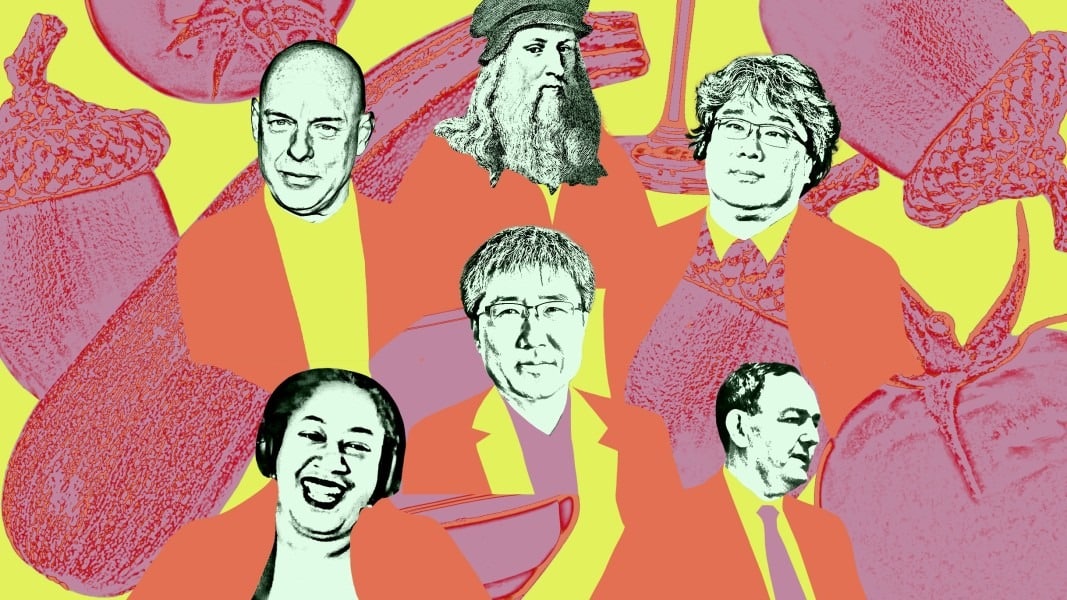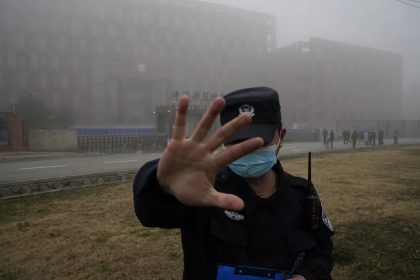The economist assembles a centuries-spanning cast of creative problem solvers to put the world to rights
My friend Brian Eno is late for my fantasy dinner party. But I can’t hold it against him. He has just given a private viewing of his generative artwork “77 Million Paintings” to Leonardo da Vinci, and the walk to my flat in Kentish Town took them longer than expected.
Da Vinci cannot stop talking about the constantly changing combinations of painting and music that Eno has created. Eno explains how generative art works — the artist sets the basic parameters through an algorithm but lets the final artwork unfold itself. “Just like nature,” he says.
Already sitting around my long dining table sipping the Peruvian cocktail pisco sour, are Herbert Simon, the originator of behavioural economics and one of the founding fathers of AI, and NK Jemisin, the American writer who is unparalleled in her ability to imagine different worlds, ranging from hardcore sci-fi settings to fantasy worlds that have redefined the genre. Chatting to me in Korean while I prepare the first course is Bong Joon-ho, the director of Parasite, who combines mystery, social commentary, horror and comedy to unique, remarkable effects.
I’ve decided — perhaps foolishly — to cook myself. This is partly because, to me, cooking for someone is the ultimate act of friendship, but it is also because I want to serve a menu that is as boundary-defying as my guests tonight.
I serve an aubergine pasta bake. Da Vinci is bowled over by my sauce, never having tasted tomato
The first course I’ve christened “Acorn Two Ways”: two dishes from opposite ends of the Eurasian landmass. One is dotori mook, a Korean dish of vegetable jelly made with acorn, served with raw vegetables and soy-and-chilli dressing. It’s made by Hee-Jeong, my wife, whose version is the best in the world. The other is jamón ibérico de bellota, Spanish ham made with pigs fed exclusively on acorns in the last stages of their lives. I serve both with Veuve Clicquot, my favourite champagne.
Da Vinci does not eat animals but enjoys the dotori mook, including the chilli kick in the dressing, which is new to him. Bong also refrains from the jamón. “After researching the meat industry for my movie, Okja, I cannot eat pork, although I occasionally eat chicken and beef,” he says.
The second course is my variation on a north African theme — cubes of chicken (vegetarian chicken substitute for Da Vinci), courgette, onion and aubergine, marinated in harissa and olive oil, and grilled until they meld together. I serve it with couscous and Grüner Veltliner, a zesty and delicate Austrian white wine. Eno and Simon discuss the banality of AI.
“Humans have always lived with collective — that is, artificial — intelligence,” Eno says. “All human systems, whether embodied in a machine or not, are artificial,” echoes Simon. Jemisin and Bong debate the meaning of consciousness — AI, human or otherwise. Jemisin’s The Trojan Girl was written from the point of view of an AI while Bong’s forthcoming movie Mickey 17 is about the same consciousness being decanted into new bodies repeatedly. Da Vinci, the genius that he is, has rapidly absorbed these new ideas and engages fully.
The main course is an Italian aubergine pasta bake, with three cheeses and tomato sauce (with lots of basil and garlic). Da Vinci is bowled over by the sauce, having never tasted tomato. I pair it with Gran Enemigo Gualtallary, my favourite red.
The conversation moves on to the climate crisis. Eno talks about the role of art in drawing people’s attention to the crisis. Simon agrees that influencing emotion, including through arts, is often the most effective way to change the world. “Often the scarcest resource in the decision-making process is attention. And the best way to claim attention is to appeal to emotion,” he explains. I ask Jemisin and Bong to talk about how they used the Broken Earth trilogy and the movie Snowpiercer to alert people to the prospect of climate collapse.
The final course is apple and rhubarb crumble, turbocharged with cinnamon, cardamom, clove and peppercorns. I serve it with Ethiopian Yirgacheffe coffee and Taiwanese milk oolong (Jin Xuan) tea.
The evening winds up with a rambling conversation over Korean soju, a clear spirit — but not just any soju, the 53 per cent Hwayo, with the cleanest taste and an epiphanic alcoholic hit. All the guests, who have crossed intellectual boundaries in such unconventional and imaginative ways, agree that many of the world’s problems will not be solved if we all stayed in intellectual silos. What better ways to break down those silos than having good food and nice drinks with people who dared to be different?
Ha-Joon Chang teaches at Soas, University of London. All these dishes feature in ‘Edible Economics: The World in 17 Dishes’ (Penguin), published this month
Follow @FTMag to find out about our latest stories first
Source: Financial Times



